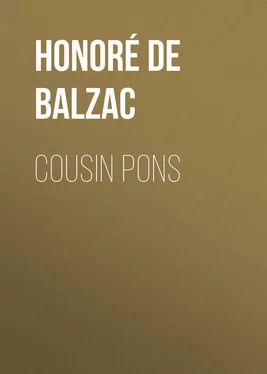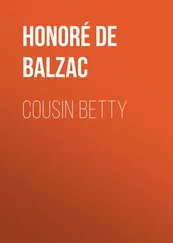Honoré Balzac - Cousin Pons
Здесь есть возможность читать онлайн «Honoré Balzac - Cousin Pons» — ознакомительный отрывок электронной книги совершенно бесплатно, а после прочтения отрывка купить полную версию. В некоторых случаях можно слушать аудио, скачать через торрент в формате fb2 и присутствует краткое содержание. Жанр: literature_19, foreign_antique, foreign_prose, на английском языке. Описание произведения, (предисловие) а так же отзывы посетителей доступны на портале библиотеки ЛибКат.
- Название:Cousin Pons
- Автор:
- Жанр:
- Год:неизвестен
- ISBN:нет данных
- Рейтинг книги:3 / 5. Голосов: 1
-
Избранное:Добавить в избранное
- Отзывы:
-
Ваша оценка:
- 60
- 1
- 2
- 3
- 4
- 5
Cousin Pons: краткое содержание, описание и аннотация
Предлагаем к чтению аннотацию, описание, краткое содержание или предисловие (зависит от того, что написал сам автор книги «Cousin Pons»). Если вы не нашли необходимую информацию о книге — напишите в комментариях, мы постараемся отыскать её.
Cousin Pons — читать онлайн ознакомительный отрывок
Ниже представлен текст книги, разбитый по страницам. Система сохранения места последней прочитанной страницы, позволяет с удобством читать онлайн бесплатно книгу «Cousin Pons», без необходимости каждый раз заново искать на чём Вы остановились. Поставьте закладку, и сможете в любой момент перейти на страницу, на которой закончили чтение.
Интервал:
Закладка:
One thing remains to be said of the characters of the pair of friends; but this one thing is precisely the hardest to make clear to ninety-nine readers out of a hundred in this forty-seventh year of the nineteenth century, perhaps by reason of the prodigious financial development brought about by the railway system. It is a little thing, and yet it is so much. It is a question, in fact, of giving an idea of the extreme sensitiveness of their natures. Let us borrow an illustration from the railways, if only by way of retaliation, as it were, for the loans which they levy upon us. The railway train of to-day, tearing over the metals, grinds away fine particles of dust, grains so minute that a traveler cannot detect them with the eye; but let a single one of those invisible motes find its way into the kidneys, it will bring about that most excruciating, and sometimes fatal, disease known as gravel. And our society, rushing like a locomotive along its metaled track, is heedless of the all but imperceptible dust made by the grinding of the wheels; but it was otherwise with the two musicians; the invisible grains of sand sank perpetually into the very fibres of their being, causing them intolerable anguish of heart. Tender exceedingly to the pain of others, they wept for their own powerlessness to help; and their own susceptibilities were almost morbidly acute. Neither age nor the continual spectacle of the drama of Paris life had hardened two souls still young and childlike and pure; the longer they lived, indeed, the more keenly they felt their inward suffering; for so it is, alas! with natures unsullied by the world, with the quiet thinker, and with such poets among the poets as have never fallen into any excess.
Since the old men began housekeeping together, the day’s routine was very nearly the same for them both. They worked together in harness in the fraternal fashion of the Paris cab-horse; rising every morning, summer and winter, at seven o’clock, and setting out after breakfast to give music lessons in the boarding-schools, in which, upon occasion, they would take lessons for each other. Towards noon Pons repaired to his theatre, if there was a rehearsal on hand; but all his spare moments were spent in sauntering on the boulevards. Night found both of them in the orchestra at the theatre, for Pons had found a place for Schmucke, and upon this wise.
At the time of their first meeting, Pons had just received that marshal’s baton of the unknown musical composer – an appointment as conductor of an orchestra. It had come to him unasked, by a favor of Count Popinot, a bourgeois hero of July, at that time a member of the Government. Count Popinot had the license of a theatre in his gift, and Count Popinot had also an old acquaintance of the kind that the successful man blushes to meet. As he rolls through the streets of Paris in his carriage, it is not pleasant to see his boyhood’s chum down at heel, with a coat of many improbable colors and trousers innocent of straps, and a head full of soaring speculations on too grand a scale to tempt shy, easily scared capital. Moreover, this friend of his youth, Gaudissart by name, had done not a little in the past towards founding the fortunes of the great house of Popinot. Popinot, now a Count and a peer of France, after twice holding a portfolio had no wish to shake off “the Illustrious Gaudissart.” Quite otherwise. The pomps and vanities of the Court of the Citizen-King had not spoiled the sometime druggist’s kind heart; he wished to put his ex-commercial traveler in the way of renewing his wardrobe and replenishing his purse. So when Gaudissart, always an enthusiastic admirer of the fair sex, applied for the license of a bankrupt theatre, Popinot granted it on condition that Pons (a parasite of the Hotel Popinot) should be engaged as conductor of the orchestra; and at the same time, the Count was careful to send certain elderly amateurs of beauty to the theatre, so that the new manager might be strongly supported financially by wealthy admirers of feminine charms revealed by the costume of the ballet.
Gaudissart and Company, who, be it said, made their fortune, hit upon the grand idea of operas for the people, and carried it out in a boulevard theatre in 1834. A tolerable conductor, who could adapt or even compose a little music upon occasion, was a necessity for ballets and pantomimes; but the last management had so long been bankrupt, that they could not afford to keep a transposer and copyist. Pons therefore introduced Schmucke to the company as copier of music, a humble calling which requires no small musical knowledge; and Schmucke, acting on Pons’ advice, came to an understanding with the chef-de-service at the Opera-Comique, so saving himself the clerical drudgery.
The partnership between Pons and Schmucke produced one brilliant result. Schmucke being a German, harmony was his strong point; he looked over the instrumentation of Pons’ compositions, and Pons provided the airs. Here and there an amateur among the audience admired the new pieces of music which served as accompaniment to two or three great successes, but they attributed the improvement vaguely to “progress.” No one cared to know the composer’s name; like occupants of the baignoires , lost to view of the house, to gain a view of the stage, Pons and Schmucke eclipsed themselves by their success. In Paris (especially since the Revolution of July) no one can hope to succeed unless he will push his way quibuscumque viis and with all his might through a formidable host of competitors; but for this feat a man needs thews and sinews, and our two friends, be it remembered, had that affection of the heart which cripples all ambitious effort.
Pons, as a rule, only went to his theatre towards eight o’clock, when the piece in favor came on, and overtures and accompaniments needed the strict ruling of the baton; most minor theatres are lax in such matters, and Pons felt the more at ease because he himself had been by no means grasping in all his dealings with the management; and Schmucke, if need be, could take his place. Time went by, and Schmucke became an institution in the orchestra; the Illustrious Gaudissart said nothing, but he was well aware of the value of Pons’ collaborator. He was obliged to include a pianoforte in the orchestra (following the example of the leading theatres); the instrument was placed beside the conductor’s chair, and Schmucke played without increase of salary – a volunteer supernumerary. As Schmucke’s character, his utter lack of ambition or pretence became known, the orchestra recognized him as one of themselves; and as time went on, he was intrusted with the often needed miscellaneous musical instruments which form no part of the regular band of a boulevard theatre. For a very small addition to his stipend, Schmucke played the viola d’amore, hautboy, violoncello, and harp, as well as the piano, the castanets for the cachucha , the bells, saxhorn, and the like. If the Germans cannot draw harmony from the mighty instruments of Liberty, yet to play all instruments of music comes to them by nature.
The two old artists were exceedingly popular at the theatre, and took its ways philosophically. They had put, as it were, scales over their eyes, lest they should see the offences that needs must come when a corps de ballet is blended with actors and actresses, one of the most trying combinations ever created by the laws of supply and demand for the torment of managers, authors, and composers alike.
Every one esteemed Pons with his kindness and his modesty, his great self-respect and respect for others; for a pure and limpid life wins something like admiration from the worst nature in every social sphere, and in Paris a fair virtue meets with something of the success of a large diamond, so great a rarity it is. No actor, no dancer however brazen, would have indulged in the mildest practical joke at the expense of either Pons or Schmucke.
Читать дальшеИнтервал:
Закладка:
Похожие книги на «Cousin Pons»
Представляем Вашему вниманию похожие книги на «Cousin Pons» списком для выбора. Мы отобрали схожую по названию и смыслу литературу в надежде предоставить читателям больше вариантов отыскать новые, интересные, ещё непрочитанные произведения.
Обсуждение, отзывы о книге «Cousin Pons» и просто собственные мнения читателей. Оставьте ваши комментарии, напишите, что Вы думаете о произведении, его смысле или главных героях. Укажите что конкретно понравилось, а что нет, и почему Вы так считаете.












